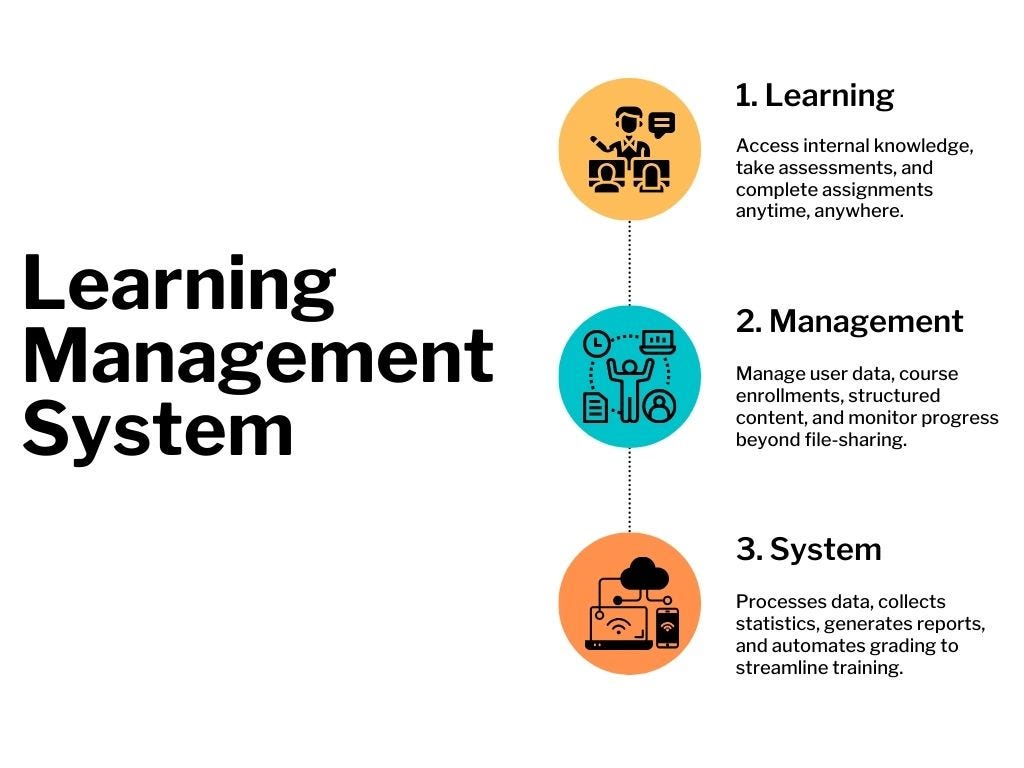The Ultimate Guide to Choosing the Right Knowing Management System
Picking a proper Discovering Administration System (LMS) is a critical choice that can substantially impact instructional performance and general business goals. With a wide variety of choices offered, it is vital to think about different elements such as user-friendliness, content compatibility, and logical abilities. Furthermore, understanding pricing frameworks and support mechanisms can affect the lasting feasibility of your choice. The subtleties of these factors to consider increase important inquiries that warrant exploration, specifically as the landscape of electronic knowing proceeds to progress. What are the vital elements that can make or damage your LMS selection?
Comprehending Learning Administration Equipment
In the context of contemporary education and learning and training, a Knowing Monitoring System (LMS) serves as an essential tool for supplying, tracking, and handling educational content. An LMS facilitates the company of instructional resources, allowing establishments and organizations to develop a central hub for discovering products. This system sustains various discovering methods, consisting of online programs, mixed understanding, and traditional classroom settings.
LMS systems are made to enhance the knowing experience by supplying an organized setting where students can access content at their benefit. They typically consist of attributes such as analyses, progress tracking, and reporting tools, which help teachers keep an eye on trainee efficiency and involvement. In addition, LMSs can be tailored to fulfill the details needs of different learners and organizations, enabling tailored educational experiences.
The integration of an LMS into educational settings also promotes collaboration among students and teachers, cultivating a feeling of neighborhood with conversation forums and group projects. As organizations increasingly identify the relevance of continual understanding and growth, the duty of LMSs in promoting reliable training options continues to grow, positioning them as indispensable possessions in the academic landscape.
Secret Features to Take Into Consideration
When picking a Discovering Management System (LMS), several vital attributes warrant mindful factor to consider to guarantee the system lines up with educational purposes. User-friendliness is important; a simple interface facilitates ease of navigation for both learners and managers.

Integration with existing devices is another considerable facet; the LMS ought to flawlessly link with devices like CRM systems, video conferencing systems, and web content repositories. canvas singapore. Mobile compatibility is significantly important, as students often like accessibility to resources on-the-go
Moreover, customization choices permit institutions to tailor the LMS to their details branding and pedagogical requirements. Consider the platform's scalability, guaranteeing it can suit future growth and changes in individual need. Focusing on these key functions will certainly aid in picking an LMS that efficiently improves the discovering experience and fulfills institutional objectives.
Pricing Designs and Budgeting
Budgeting for a Learning Management System (LMS) needs a comprehensive understanding of various prices designs to make certain a lasting investment. Organizations must examine their details requirements and lasting objectives while taking into consideration the economic implications of each LMS option.

In enhancement to the base rates, organizations should additionally take into consideration prospective extra costs such as implementation, upkeep, and assistance services. It is crucial to assess the complete expense of ownership over the LMS's lifecycle, including possible upgrades or extra features that might be needed as the organization grows. By meticulously assessing these prices designs and connected prices, companies can make informed choices that line up with their financial constraints and instructional purposes.
Assessing Customer Experience
Evaluating the effectiveness of an Understanding Administration System (LMS) exceeds economic factors to consider; individual experience plays a crucial duty in the general success of the system. A properly designed interface can considerably improve involvement and retention, making it important to assess how instinctive the system is for both managers and students.
When assessing individual experience, think about navigational simplicity, access attributes, and the responsiveness of the system across numerous devices. An LMS needs to offer a smooth experience, permitting users to swiftly locate resources, track development, and involve with content without unnecessary rubbing.
In addition, gather comments from real customers to gauge contentment levels and identify prospective discomfort factors. Emphasis groups or surveys can provide beneficial insights into exactly how students connect with the system and any kind of challenges they face.
It's likewise critical to examine the level of customization offered within the LMS. A versatile system that enables companies to customize the user interface and includes to their details demands can significantly improve user engagement. Ultimately, a positive user experience fosters a learning environment that encourages involvement and helps with understanding retention, making it a crucial consider the choice of an LMS.
Application and Assistance Choices
Effectively rolling out an Understanding Administration System (LMS) requires careful consideration of both execution approaches and recurring assistance choices. A well-planned execution approach is vital for lessening interruptions and making best use of individual adoption. Organizations should review whether they will certainly manage the implementation in-house or team up with the LMS vendor. In-house groups may call for training and sources to efficiently establish and tailor the system, while vendor partnerships can supply experience and enhance the process.
Recurring support is just as essential to make certain the LMS remains reliable and user-friendly - canvas singapore. Organizations must assess the kinds of assistance provided by the supplier, including technical aid, user training, and routine updates. A durable support system can assist resolve concerns quickly, consequently enhancing customer fulfillment and involvement
Furthermore, consider the accessibility of sources such as user manuals, FAQs, and on-line discussion forums. These can empower users to fix their very own concerns and foster a sense of community. Eventually, the appropriate execution and support options will not only assist in a smoother change to the LMS yet also contribute to its long-term success within the organization.
Final Thought
In final thought, choosing an ideal Understanding Monitoring System (LMS) requires cautious consideration of a number of essential elements, consisting of crucial attributes, prices versions, individual experience, and implementation approaches. An appropriate LMS not only boosts educational end results however likewise promotes partnership among users and integrates seamlessly with existing devices. canvas singapore. Inevitably, a thorough evaluation of these components will certainly sustain organizations learning management system singapore in achieving their educational purposes and making sure a successful knowing environment for all stakeholders entailed